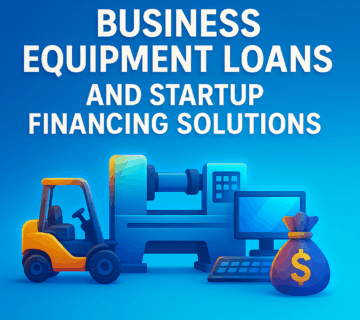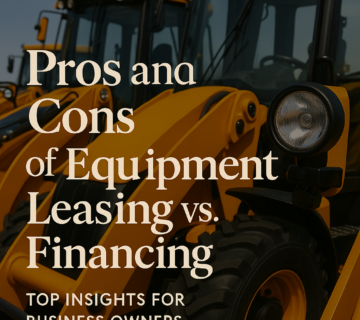6 Ways to Secure Funding for Your Business Equipment in 2024

Whether it’s for expanding your capabilities or staying up to date with the latest technology, securing funding for essential business equipment is often a key challenge. Fortunately, multiple methods are available to help small business owners get the resources they need. In this guide, we’ll explore the top 6 ways to secure funding for your business equipment in 2024, providing valuable insights into the best approaches available for your unique needs.
The Importance of Equipment Financing for Businesses
Why Small Businesses Need Equipment Financing
Small business equipment financing is crucial for enabling growth and keeping up with operational demands. For small enterprises, having access to reliable machinery, technology, or specialized tools means they can stay competitive without suffering the heavy burden of upfront costs. Most small businesses operate with tight budgets, and large cash outlays for equipment may hamper liquidity, which is why financing has become such a popular alternative.
Types of Equipment That Typically Need Financing
From heavy-duty manufacturing machines to computer servers, a variety of equipment can be financed to keep your operations running smoothly. Different industries have different needs: construction companies may need financing for bulldozers and cranes, while a bakery may need ovens and mixers. Identifying the specific equipment required can help you target the right financing options.
Way #1: Traditional Bank Loans
Overview of Bank Loan Processes
Traditional bank loans are one of the most well-known ways to finance business equipment. Banks offer loans with competitive interest rates for those with strong credit histories and solid financial documentation. With a bank loan, businesses can secure the funds they need to purchase their equipment outright, which means they eventually own the equipment free and clear after the loan is paid off.
Pros and Cons of Using Bank Loans for Equipment
Bank loans often offer favorable terms, including lower interest rates compared to other sources. However, they can be difficult to qualify for, especially for startups or small businesses with inconsistent cash flows. The application process can also be lengthy, and banks tend to require substantial collateral or personal guarantees, which can be prohibitive.
Way #2: Small Business Equipment Financing Companies
What is Small Business Equipment Financing?
Small business equipment financing companies specialize in providing loans or leases to acquire essential equipment. Unlike banks, these companies are often more flexible, catering specifically to the needs of small enterprises.
How Financing Companies Differ from Banks
Unlike traditional banks, equipment financing companies are typically more lenient when assessing credit scores, making them a viable option for those with moderate credit. They also have faster approval times, which is especially helpful when your business needs to seize opportunities quickly.
Key Equipment Finance Services Offered
Benefits of Equipment Finance Services
Equipment finance services often provide tailored payment plans, which help small businesses manage cash flow more efficiently. These services also tend to include advisory features, helping business owners decide between leasing and purchasing based on their operational needs.
Way #3: SBA Loans for Equipment Purchase
The Role of the Small Business Administration (SBA)
The Small Business Administration (SBA) provides government-backed loans to help small businesses secure financing. SBA loans are particularly attractive because of their favorable terms, which often include lower interest rates and longer repayment periods.
How to Qualify for SBA Loans for Equipment
Qualifying for an SBA loan requires thorough preparation. Your business must meet the size standards defined by the SBA, and you will need a well-prepared business plan, good credit, and sometimes collateral. The application process can be tedious but worthwhile, given the attractive financing terms.
Way #4: Equipment Leasing Options
Difference Between Leasing and Financing
Leasing differs from financing in that you do not own the equipment outright after payments are complete. Instead, you pay to use the equipment over a specific time frame, and often have the option to buy at the end of the lease term.
Pros of Leasing Business Equipment
Leasing is a good option if your business uses equipment that becomes obsolete quickly, such as technology. By leasing, you can easily upgrade without the hassle of reselling outdated items. Leasing can also lower initial costs, preserving working capital for other needs.
Is Leasing Right for Your Business?
If your business needs equipment that rapidly loses value or if your goal is to frequently upgrade, leasing is probably your best bet. Additionally, leasing doesn’t require the upfront investment that traditional loans do, making it ideal for young businesses without significant capital.
Way #5: Vendor Financing Programs
What is Vendor Financing?
Vendor financing involves a manufacturer or vendor offering financing directly to the purchaser. Essentially, the vendor acts as the lender, allowing small businesses to purchase their products on installment plans. This can be highly convenient, as the financing is provided directly from the source of the equipment.
How Vendor Financing Can Benefit Small Businesses
Vendor financing is particularly advantageous because of its streamlined process—often the vendor is motivated to help you secure the purchase, meaning faster approvals and more favorable terms. This also helps build strong relationships with vendors, possibly leading to discounts or perks on future purchases.
Success Stories of Businesses Using Vendor Financing
Many small businesses have successfully used vendor financing to grow. For instance, a catering business might use vendor financing to acquire essential kitchen equipment that allows them to expand their services. These types of stories illustrate how accessible vendor financing can be a real catalyst for growth.
Way #6: Online Alternative Lenders
The Rise of Fintech and Online Lenders
Online alternative lenders, often referred to as Fintech companies, have emerged as a popular source for equipment financing. These companies use technology to assess risk and provide funding quickly, making it a convenient option for small businesses needing swift funding.
Pros and Cons of Using Online Lenders
The primary advantage of online lenders is speed; approvals can happen in hours rather than weeks. Many also offer more lenient credit requirements. However, the convenience can come at a cost, as interest rates are generally higher than those offered by banks or SBA-backed loans.
Comparing All Six Options
Factors to Consider: Interest Rates, Flexibility, and Terms
When deciding which route to take, consider factors such as interest rates, repayment flexibility, and the total cost over time. Some options, like SBA loans, offer the lowest rates but require stringent qualifications. Meanwhile, online lenders might offer more flexibility but at a higher interest rate.
How to Decide Which Option Suits Your Needs
Your choice will depend largely on your business’s unique situation. If you have strong credit and can afford a slower process, traditional bank loans or SBA loans are preferable. If speed is of the essence, online lenders might be the way to go. Vendor financing is ideal if you have a strong relationship with your supplier and want to streamline the purchasing process.
Application Tips for Securing Equipment Funding
Tips for Strengthening Your Application
To improve your chances of securing funding, make sure your credit score is in good shape, gather all necessary financial documentation, and prepare a clear and compelling business plan. Demonstrating a stable cash flow is also crucial, as lenders want assurance that you can make timely payments.
Common Mistakes to Avoid
Avoid underestimating the total cost of the equipment, including potential fees, taxes, and installation expenses. Failing to prepare thoroughly for the application process can also hurt your chances. Be sure to avoid late submissions and incomplete paperwork.




No comment